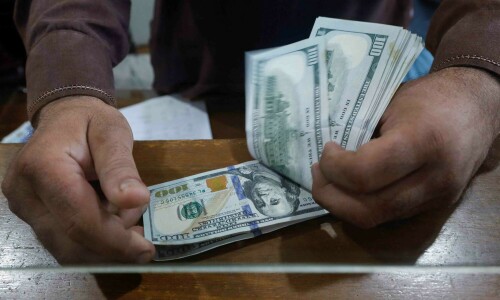With the government scrambling for dollars, knocking one door after the other to raise cash to keep the ongoing balance of payment crisis from morphing into a sovereign default, not less than a billion dollars in ‘overdue export proceeds’ remain to be repatriated.
The overdue export proceeds are those where an exporter is unable to repatriate their export revenues within 90-120 days from the date of shipment or within such periods as may be determined for the purpose by the State Bank of Pakistan (SBP) for a particular sector, as notified from time to time, or on the due date of the bill whichever is earlier.
“The amount of $1 billion in overdue export proceeds is the one that is stuck in the SBP’s adjudication process. The actual amount of delayed export revenues could be three times bigger than that,” a senior banker who deals with such cases on behalf of his bank tells this correspondent.
For example, he points out that the overdue export proceeds that remain to be repatriated in spite of the passage of the due time in the case of his bank are nearly $150 million. “But only a third of that amount — $50m — is in the adjudication process of the State Bank,” he notes.
Timely realisation of the export proceeds of willful defaulters cannot be ensured without strict enforcement of AML/CFT regime
The delay of a few days or even weeks in repatriation of the export proceeds is not unusual because of genuine reasons, he says. Only the cases of chronic defaulting exporters are brought to the SBP’s adjudication panels. Some cases being adjudicated by the SBP pertain to export shipments made as long ago as one year to 20 years, the bankers claim.
Mostly, the chronic or wilful defaulting exporters are smaller, non-corporate entities and use the two riskiest modes of international trade settlement — ‘open account’ or ‘collections (contract basis)’ — for shipping their goods to their foreign buyers.
Over the past few years, especially during the pandemic, some exporters were not able to fully repatriate foreign proceeds against exports due to insolvency or bankruptcy of the foreign importers or refusal by importers to accept the exported goods and make payment, or for any other situation beyond the control of the exporters. In such cases, the exporters had to suffer significant losses.
Sometimes, exporters believe that the rupee might depreciate and hence delay the receipt of export proceeds, as seen during periods of high volatility in the foreign exchange market. The home currency depreciation always suits exporters as this fetches them a higher amount in rupee value.
However, the bankers contend, there are several ‘defaulters’ exporters who wilfully and intentionally keep their export proceeds abroad for investment purposes and bring back only the gains on their foreign investments.
The delay in the receipt of the export payments often reduces the supply of dollars in the economy, bringing pressure on the exchange rate and leading to home currency depreciation. Besides, it creates a dollar liquidity crunch for commercial banks and restricts their capacity to finance even essential imports.
The rupee lost almost a fifth of its value in 2023 due to the dollar supply gap as the country barely averted a default with the help of the International Monetary Fund, which signed off on a $3 billion short-term loan deal in July.
The year also saw the government impose strict import restrictions — often disallowing essential imports like pharmaceutical raw materials — to save dollars to prevent a sovereign default. “Pakistan, which is already experiencing critically low foreign exchange reserves and a high risk of default on foreign debt repayments, cannot afford such delays,” another banker argues.
The chronic overdue export proceeds portfolio is increasing in spite of measures taken by the State Bank last year to accelerate the realisation of the delayed export revenues to shore up the nation’s dwindling foreign exchange reserves.
In February 2023, the central bank decided to initiate necessary action in all those export cases where full export proceeds are not realised within the prescribed period as defined in the Foreign Exchange Manual. Changes were made in the manual to deny the defaulters the exchange rate benefits on their delayed export proceeds.
In March, the State Bank issued new regulations to tighten the process of repatriating export earnings into the country. Under the new rules, the exporters who delay bringing their export earnings into the country would face fines between three per cent and 9pc of their realised export proceeds.
The fines will be imposed if export proceeds are realised fully or partially after the prescribed period of up to 180 days, or earlier in some cases. In cases where export proceeds are realised, fully or partially, after the prescribed period (a maximum of 180 days in majority cases or earlier), authorised dealers (mostly commercial banks) would convert the export proceeds at the prevailing market exchange rate and credit the same into the exporters’ account.
They will also mark a 3pc lien on the amount of export proceeds delayed by up to 30 days, 6pc on the realisation of export proceeds delayed by more than 30 days to a maximum of 60 days, and 9pc on export payment received with a delay of more than 60 days.
Since the inception of foreign exchange judicial proceedings in 1990, the SBP has managed to realise $1.25bn from the defaulter exporters. Of this, $182m was repatriated in FY21 alone, mostly from Karachi ($58.5m), Lahore ($41.9m), Sialkot ($40.7m) and Faisalabad ($24.1m). More than 11,700 cases were adjudicated during that year. At the same time, 10,384 new cases were lodged in the same year, underlining the extent of the issue.
The bankers say the adjudication process is very slow, and penalties are low. Under the present rules, the defaulting exporters can be fined up to Rs500,000 for each contravention, and where the contravention is a continuing one with a further penalty which may extend to Rs10,000 for each day during which such contravention continues.
Thus, just Rs26m were recovered in fines from the defaulting exporters. “There are several reasons for the slow realisation of overdue export proceeds through the adjudication process,” a banker says. “For starters, it is difficult to determine wilful delay in repatriation of the proceeds. Then, the exporters often use their influence to delay the process. In some cases, it is seen that the adjudicating officers favouring and obliging the defaulting exporters,” he concludes.
He says the timely realisation of the export proceeds of willful defaulters cannot be ensured without strict enforcement of anti-money laundering and combating the financing of terrorism (AML/CFT) regime. “In addition to that, the SBP will have to ensure that the adjusting officers conclude the cases swiftly and award heavy penalties to the wilful defaulters to set an example for the others.”
Published in Dawn, The Business and Finance Weekly, January 15th, 2024















































Dear visitor, the comments section is undergoing an overhaul and will return soon.